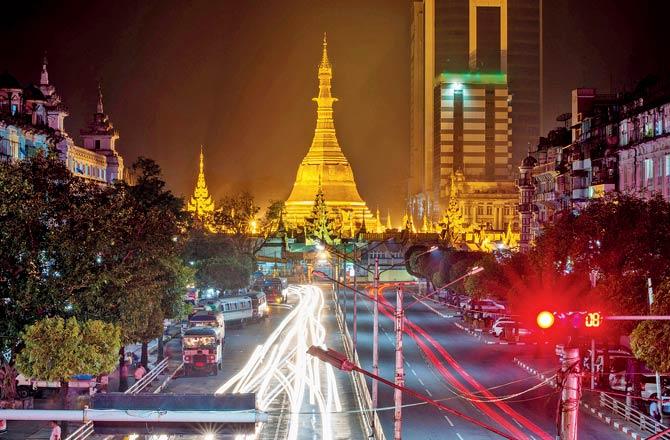I spent the last month in Myanmar, a country with whom some of our historical roots are intertwined

Sulepaya pagoda located in the centre of Yangon township
 spent the last month in Myanmar, a country with whom some of our historical roots are intertwined. One night, after noisy and cheerful goodbyes, I got into a cab, and within minutes, the taxi driver asked me where I was from. On confirming I was Indian, more questions about my origins. I thought I noticed a certain roundedness in his accent which felt Indian, but in every other way he seemed Burmese. So, I dismissed it as my ignorance about different accents of the country.
spent the last month in Myanmar, a country with whom some of our historical roots are intertwined. One night, after noisy and cheerful goodbyes, I got into a cab, and within minutes, the taxi driver asked me where I was from. On confirming I was Indian, more questions about my origins. I thought I noticed a certain roundedness in his accent which felt Indian, but in every other way he seemed Burmese. So, I dismissed it as my ignorance about different accents of the country.

Sulepaya pagoda located in the centre of Yangon township
ADVERTISEMENT
However, it turned out he was indeed of Indian origin. His family had been there for three or four generations. He had grown up in Shan state — which he exhorted me to visit if I wanted to see real beauty — but his family now lived and worked in Yangon (formerly Rangoon).
I did the Indian thing and asked him his name. "My name is So Myiang Toh (pronounced So Man Toe)," said he. "Arre, you have a Burmese name?" I asked, unable to hide my surprise. He seemed puzzled by my surprise. I assumed it was through intermarriage, but learned it was simply how everyone is. "I have a Bengali name too — Utpata Datt — but that is only for temple," he explained, confusing me more.
I understood from him that your Indian name registered you in the temple and was used in rituals but it was not the name you lived with. Highly intrigued, I asked him the names — Burmese and Indian names — of practically his whole family, right up to his grandparents. Sure enough, he indulged my amusement. He told me he had gotten married two years ago and now had a baby. Of course, I promptly and predictably asked him the baby's Burmese name (which I can't remember now but it meant something like 'moonlight'). "And what's your baby's temple name?" I asked.
"His Bengali name is…um…er…" He struggled to remember for a couple of minutes, and then sent out an exhalation of giving up. "I can't remember what it is," he said. We both laughed and I reached my destination. In the last few years, the NRI has become a dominant figure of our cultural and political conversations. But, we speak of only one kind of NRI, whether positively or opposingly — a certain elite NRI who wishes to assert claims on both, the country of their origin and the one of their choice.
Not every migrant clings to their identity in quite the same way – that's also true of those who migrate within a country. Many, out of necessity or ease, organically merge their ways with their new contexts, creating new identities in new spaces, not split and anxious about being two competing selves. They hold on to their origins in private, cultural or emotional ways and, over time, these become vestigial, whether out of necessity or convenience or simply the rhythm of life. Perhaps the difference of wanting to assert these claims — or not — is rooted in their originating identities of class and caste.
The conversation in the cab was an important and beautiful reminder that just as there is no one sweeping Indian identity, so there are many different histories of migration and different NRI (for lack of a better word) identities in a marvellously complicated world.
Paromita Vohra is an award-winning Mumbai-based filmmaker, writer and curator working with fiction and non-fiction. Reach her at www.parodevipictures.com
 Subscribe today by clicking the link and stay updated with the latest news!" Click here!
Subscribe today by clicking the link and stay updated with the latest news!" Click here!







